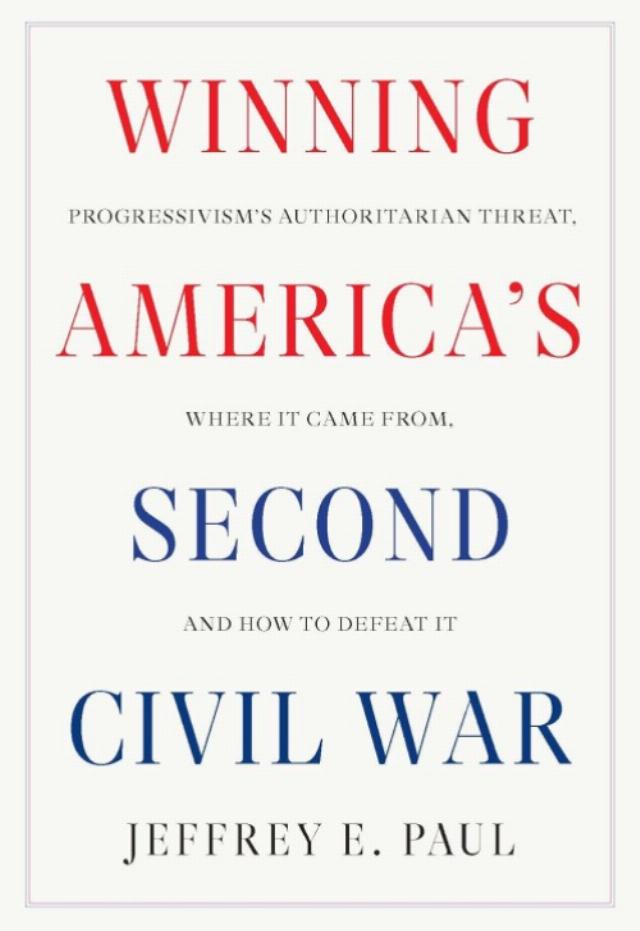Book Review: Thwarting the Attack on American Liberty
During July, the month we celebrate America’s independence, we must be extra vigilant and victorious against those seeking our dependence. In Winning America’s Second Civil War: Progressivism’s Authoritarian Threat, Where It Came From, and How to Defeat It, research professor Jeffrey E. Paul promotes America’s independence and exposes the left’s long war to make Americans dependent on an elite, socialist autocracy. This exceptionally important book may have escaped many people’s notice.
Winning America’s Second Civil War begins by exposing in meticulous detail the origin of the progressive infestation into academia in the mid- to late- 1800s. American progressivism—referring to a term taken from Germany’s Progress Party—began with American doctoral students studying in Germany and learning about the concept of the superiority of government control over individual liberty.
Upon earning their degrees, these indoctrinated students then returned to the United States to begin and/or teach in doctoral programs, such as programs in social studies, humanities, journalism, economics, and law at Columbia, Harvard, Johns Hopkins, and the like. As Winning America’s Second Civil War explains: “The first American doctoral programs were founded by men whose views were the antithesis of the ones that animated the American Revolution and Civil War.”
 Sadly, the progressive mindset revealed in Winning America’s Second Civil War gave rise to communist and fascist governments and the historical destruction wrought by socialism in general. And, unfortunately, a socialist history has been slowly but steadily unfurled across America since the late 1800s.
Sadly, the progressive mindset revealed in Winning America’s Second Civil War gave rise to communist and fascist governments and the historical destruction wrought by socialism in general. And, unfortunately, a socialist history has been slowly but steadily unfurled across America since the late 1800s.
Today, the socialists’ drive to enslave Americans is exceptionally strong thanks to an education system that begins indoctrination at the earliest grade levels. As so many authors have noted, students are being indoctrinated not educated. Additionally, thinking skills have been largely reduced to regurgitation of “settled facts” rather than thoughtful reflection, synthesis of ideas, and objective creativity.
Indoctrination leads to subjugation, as witnessed by non-thinking compliance with “trust us, we’re experts,” “consensus science,” and “I am the science.”
Furthermore, reading through Winning America’s Second Civil War, you begin to understand where sentiments such as “you didn’t build that” originate—from the idea that the government and a collective of people can claim shared ownership of individual innovation and hard work.
Years ago, in Intellectuals and Society (Basic Books, 2010), Thomas Sowell observed that “[w]hat is most frightening about the political left is that it seems to have no sense of the tragedy of the human condition. All problems seem to them to be due to other people not being as wise or as noble as they are.” However, regarding the population at large, Sowell further notes that they “may have vastly more total knowledge—in the mundane sense—than the elites, even if that knowledge is scattered in individually unimpressive fragments among the vast numbers of people.”
Winning America’s Second Civil War proposes and substantiates solutions to return America to the individualism that truly helped to make America great. The book identifies challenges in academia, law, and media, as well as the effort to achieve one-party governance, and expands upon workable solutions.
For example, the book acknowledges that
[A] formal commitment to equality before the law has been repudiated among the most recent generation of (newly rebranded) progressive academics by so-called antiracism, which is itself a blatantly racialist ideology—an ideology that is spreading throughout public schools, collegiate-level educational institutions, across professions from journalism to medicine, in government, indeed throughout the culture.
Winning America’s Second Civil War then inspires the reader to address such un-American cultural aberrations.
One of the most serious and complex challenges that the book identifies—which links to the other challenges—relates to the tax structure. The solution is also serious and complex.
Succinctly, the proposed and intricately detailed solution is to eventually overhaul the current tax system by replacing it with a universal sales tax (UST). The new tax will capture money from not only the sales of goods but also from labor services and financial assets (like securities, derivatives, and housing ownership).
The appendix to Winning America’s Second Civil War, which includes an “Evaluation of a Universal Sales Tax” by economists Jason DeBacker and Matthew Jensen, provides a qualitative discussion of the significant effects of a new UST program along with a macroeconomic analysis of the impacts of the UST proposal.
The proffered UST solution is one that deserves careful consideration as an option that can realign the US to its original course.
Winning America’s Second Civil War gives a clear, dire warning to a free people that in addition to threats from without, you must understand, be on guard against, and resist very real threats from within.
Anthony J. Sadar is a Certified Consulting Meteorologist and an adjunct associate professor of science at Geneva College, Beaver Falls, PA. He is also co-author of Environmental Risk Communication: Principles and Practices for Industry (CRC Press).





